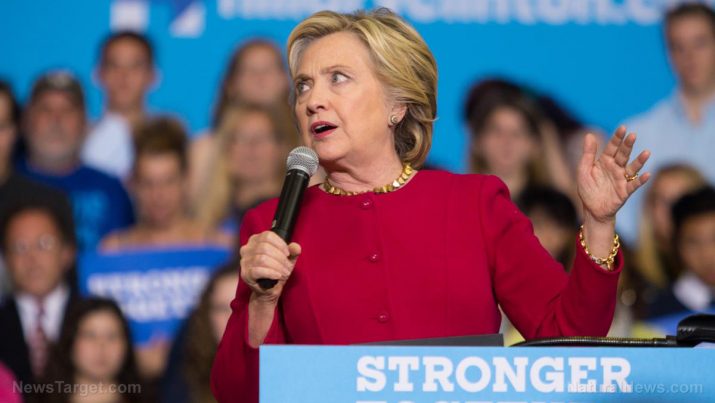
Shocking new data show Hillary Clinton nearly won the 2016 election due to fraudulent votes
Sunday, September 10, 2017 by Ethan Huff
http://www.deepstate.news/2017-09-10-shocking-new-data-show-hillary-clinton-nearly-won-the-2016-election-due-to-fraudulent-votes.html

Did the Hillary Clinton campaign commit voter fraud to win the state of New Hampshire during the 2016 election? New data obtained by the Public Interest Legal Foundation (PILF) seems to suggest so, indicating that Clinton’s narrow win by a mere 2,700 votes in the Granite State would have actually been a loss, were it not for 6,000 mysterious last-minute voter registrations – many or all of which became votes for Clinton – that conveniently popped up on Election Day.
New Hampshire’s current Speaker of the House, Shawn Jasper, decided to obtain and further investigate his state’s voter registration data after noticing the anomaly in the voter registration system. After probing into it a little more deeply, Jasper discovered that nearly all of these mystery voter registrations can no longer be found in New Hampshire, indicating that they may have been fly-by-night attempts to thwart the state’s vote tally.
Beyond this, a mere 1,014 of the 6,000 mystery registrations were found to be tied to New Hampshire driver’s licenses. Of those 5,526 voters who never obtained a New Hampshire driver’s license, only a paltry three percent were found to have vehicles registered in New Hampshire – this further suggesting foul play during the final hour to sway the state towards Clinton.
The real smoking gun, however, was the 70 percent of same-day registrants in New Hampshire who used out-of-state photo identification to take advantage of New Hampshire’s lax same-day voter registration provisions. These provisions can be easily taken advantage of because they prohibit verifying a registrant’s residency prior to the election, meaning anyone can technically swing on into New Hampshire the day of an election and speciously cast a vote in order to fix an election.
“These new data illustrate the problem with same-day registration laws: they prevent the ability to verify residency prior to the election – and in a close election, that can make a difference,” writes J. Christian Adams for PJ Media. “As John Fund and Hans von Spakovsky pointed out in their book Who’s Counting, same-day registration fraud won Al Franken his Senate seat, and that extra Democratic seat then gave the country Obamacare.”
Voter fraud took place all across the US, PILF inquiry finds
Back in early 2016, PILF threatened to file lawsuits against more than 30 counties across the country for similar suspicions about voter fraud. In some of these counties, there were more people registered to vote than there were eligible voters, for instance. In others, the number of registrants was found to be “implausibly high,” further suggesting the possibility of voter fraud.
“Voter rolls across America contain substantial numbers of ineligible voters, resulting in the possible disenfranchisement of legally eligible voters via ballot dilution that threatens to taint the integrity of the election process,” a notice issued by the organization to these counties explained.
“Based on our comparison of publicly available information published by the U.S. Census Bureau and the Federal Election Assistance Commission, your county is failing to comply with Section 8 of the National Voter Registration Act (NVRA). Federal law requires election officials to conduct a reasonable effort to maintain voter registration lists free of dead voters, ineligible voters and voters that have moved away … In short, your county has an implausible number of registered voters compared to the number of eligible living citizens.”
Ironically enough, after losing the election the Clinton camp had the audacity to accuse the Trump campaign of committing voter fraud. Failed Green Party candidate Jill Stein ended up becoming the mouthpiece for recounts in the states of Wisconsin, Pennsylvania, and Michigan, none of which were successful in achieving an after-the-fact victory for Clinton.
Sources for this article include:
Tagged Under: Tags: 2016 election, elections, fraudulent votes, Hillary Clinton, New Hampshire, Public Interest Legal Foundation, voter fraud





